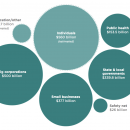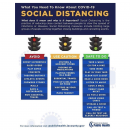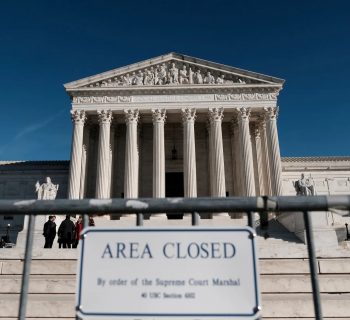By: Kathleen R. Page, M.D., Maya Venkataramani, M.D., Chris Beyrer, M.D., M.P.H., and Sarah Polk, M.D., M.H.S., ~ New England Journal of Medicine ~ March 27, 2020
In 2019, as the “public charge” rule made its way through the U.S. court system, many low-income immigrant parents of American children in the Johns Hopkins pediatric practice asked our case managers to disenroll their children from the Supplemental Nutrition Assistance Program (SNAP), fearing it would affect their chances of obtaining legal status in the future or lead to deportation.
The new public charge rule, which went into effect on February 24, 2020, states that “aliens are inadmissible to the United States if they are unable to care for themselves without becoming public charges” www.uscis.gov/greencard/public-charge).
On the day of its implementation, there were 14 cases of Covid-19 in the United States. A month later, with more than 30,000 U.S. cases confirmed, the following message could be found on the U.S. Citizen and Immigration Services (USCIS) Public Charge web page: “USCIS encourages all those, including aliens, with symptoms that resemble Coronavirus Disease 2019 (Covid-19) (fever, cough, shortness of breath) to seek necessary medical treatment or preventive services. Such treatment or preventive services will not negatively affect any alien as part of a future Public Charge analysis.”1
This statement may feel like vindication for those of us who have been warning about the negative impact of anti-immigration policies on public health,2 but we fear this change is too little, too late. Under the Trump administration, immigrants have faced relentless attacks — tightening of the public charge rule, threats to the Deferred Action for Childhood Arrivals program, raids by Immigration and Customs Enforcement (ICE), asylum restrictions, and separation of families at the border — so immigrants are justifiably scared. Expecting them to trust the government now, during the Covid-19 crisis, is naive at best.
As community organizations, activists, and health care providers scramble to reach out to immigrants and encourage them to seek care for Covid-19 if necessary, we are using mitigation strategies that will not compensate for years of harm.
Covid-19 has exposed weaknesses in the U.S. health system. The country faces shortages of personal protective equipment, tests, and ventilators. As emergency departments (EDs) and intensive care units brace for surges in volume, public health officials urge people with symptoms to stay home and call their doctor before seeking in-person medical care.
Unfortunately, for many undocumented immigrants, calling their doctor is not an option. The Affordable Care Act excludes undocumented immigrants from eligibility for coverage, and an estimated 7.1 million undocumented immigrants lack health insurance.3
As a result, many undocumented immigrants do not have primary care providers (PCPs) and have had to rely on EDs for years. Telling people now to avoid EDs and call their doctors leaves those without PCPs in limbo. The Covid-19 epidemic has exposed the risk of limiting access to primary care for segments of the population, including undocumented immigrants.
For most people, Covid-19 is a mild illness that can be managed at home. Limiting unnecessary visits to clinics and EDs will save resources for people who really need them and reduce potential exposures and ongoing transmission. It’s important, however, that people who are vulnerable to serious infection — the elderly and those with chronic medical conditions — contact providers to determine the need for testing or monitoring.
Although the immigrant community tends to be young and healthy, the prevalence of diabetes, a risk factor for severe Covid-19, is 22% among Latinos, the highest for any U.S. racial or ethnic group.4
Given the collective anxiety regarding the epidemic, even low-risk patients may benefit from talking to their clinicians about symptoms, getting reassurance, and discussing an appropriate plan of care.
Without a PCP to call, many uninsured immigrants will resort to online information, whether accurate or inaccurate; some will go to the ED, perhaps unnecessarily; and others will wait too long to seek care. Under the Public Health Service Act, the United States could provide free Covid-19 care in response to a public health emergency.
It’s still unclear how this provision will be applied to this epidemic, however, and for uninsured people, worries about out-of-pocket costs will hinder testing and care, especially as jobs evaporate.
Even among those with a PCP, the rapid transition to telemedicine will be difficult for patients with limited English proficiency who may lack access to computers for videoconferencing and have to rely on telephonic visits involving interpreters, without the benefit of visual cues.
As the country has adopted a suppression strategy, people have been asked to stay home as much as possible. The profound economic impact of these measures will be especially harsh for undocumented immigrants, many of whom work in service industries such as restaurants and hotels, or in the informal economy.
Many immigrants will have no income and are excluded from the social safety net. Extreme poverty will extend to the more than 5 million U.S.-born children who have undocumented-immigrant parents. The $1 trillion economic relief package, which includes paid-leave benefits and direct cash for Americans, will not reach most undocumented immigrants or their families.
The disenrollment of immigrant families from SNAP over the past year takes on new meaning in light of the economic crisis resulting from Covid-19. With children home from school, the U.S. Department of Agriculture Food and Nutrition Service has relaxed guidelines to enable summer food service and national school lunch programs to serve meals in non-congregate settings, but children of immigrants who disenrolled in SNAP will not receive these services.
According to one study, 8.3 million U.S. children live in households with at least one noncitizen adult and are at risk of losing Medicaid or Children’s Health Insurance Program (CHIP) benefits, household nutrition assistance, or both.5 Maryland Medicaid has stated that children due to re-enroll in March will be kept enrolled, given the barriers to re-enrollment.
The Maryland Department of Social Services has not yet done the same for SNAP enrollees; its offices are closed, and online and telephone enrollment are particularly problematic for immigrant parents.
Finally, the Trump administration must address dire conditions in immigration detention centers. Under public pressure, ICE announced on March 18 that its “highest priorities are to promote life-saving and public safety activities,” and that it will therefore focus detention efforts on those posing a public safety risk and “delay enforcement actions until after the crisis or utilize alternatives to detention, as appropriate” (www.ice.gov/COVID19).
To promote “lifesaving” activities, ICE should release low-flight-risk detainees who are in custody. According to ICE, protocols are in place to screen and isolate detainees with Covid-19 symptoms. But infections transmitted through droplets, like influenza and SARS-CoV-2, are particularly difficult to control in detention facilities, since 6-foot distancing and proper decontamination of surfaces are virtually impossible.
ICE facilities must adhere to Performance-Based National Detention Standards, which include access to medical care. However, most detained immigrants are housed in one of the more than 250 local detention facilities operating under intergovernmental services agreements or private facilities, which are not subject to these standards, and medical care in these settings is highly variable.
Moreover, deaths from influenza have occurred in federal detention centers, highlighting lapses in care. Covid-19 will further strain a tenuous infrastructure. The logical solution is to reduce the number of people in detention as soon as possible.
Immigrants are part of our national fabric. Undocumented immigrants make vital contributions to the economy. Many have low-wage essential jobs as home health aides and will be helping our vulnerable elders. Others are babysitters and are indispensable to many families in this crisis. Responding to the epidemic will require a unifying approach. It will be difficult to reverse years of anti-immigrant policies and rhetoric, but we believe it’s essential that the administration address the needs of undocumented immigrants in its Covid-19 response.
They can start by expanding access to care. The Families First Coronavirus Response Act (FFCRA) passed on March 18 provides coverage for Covid-19 testing for the uninsured through National Disaster Medical System reimbursements.
This is welcome news but does not go far enough. All care associated with patients with symptoms of Covid-19 should be covered, regardless of insurance status. Establishing multilingual Covid-19 hotlines through the 211 system with capability and clinical backup to triage calls from symptomatic people could help bridge the gap to care for those lacking a PCP.
In addition, suspending the public charge rule is imperative during this crisis. The FFCRA increases funding for SNAP and the Special Supplemental Nutrition Program for Women, Infants, and Children in response to the economic impact of Covid-19.
But given the public charge rule, immigrants may hesitate to obtain nutrition benefits for their children for fear of deportation or family separation. Furthermore, eligibility criteria for these benefits should be liberal to ensure that the most socioeconomically disadvantaged, including people without traditional proof-of-income documents, are not excluded.
Finally, low-flight-risk immigrants should be released from detention. Facing the threat of Covid-19 in prisons, local jurisdictions have begun reducing inmate populations by identifying people detained for minor crimes or vulnerable to severe infection due to underlying conditions or age. A similar process can be applied to detention facilities.
These measures, together with an empathetic and inclusive message from the highest levels of leadership, will not reverse but may mitigate Covid-19’s impact on undocumented immigrants and the health of the public at large.
Source: Kathleen R. Page, M.D., Maya Venkataramani, M.D., Chris Beyrer, M.D., M.P.H., and Sarah Polk, M.D., M.H.S., ~ New England Journal of Medicine ~ March 27, 2020







